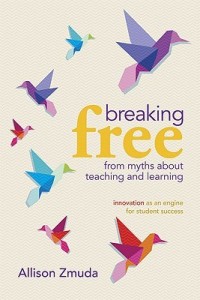
Teaching kids how to cope with mistakes and failure is one of the toughest (and most important) aspects of our jobs as educators. Most of our schools are set up in a way that values a limited number of intelligences, so students who aren’t naturally successful in the traditional areas and core academic subjects often feel frustrated and dumb. The way that schools define failure and success by test scores only compounds the problem. Many children are terrified of taking risks, and view failure as the worst thing that can happen to them. They want to play it safe, fly under the radar, and just get by.
So what do we do about these issues? I’ve invited Allison Zmudato answer some questions on this topic for us. She’s the author of a powerful new book called Breaking Free from Myths About Teaching and Learning: Innovation as an Engine for Student Success. In it, she shares some revolutionary ideas that individual teachers can use to transform the way they educate students despite dysfunctional school systems. Allison clearly understands the stressful situations that teachers face and makes a solid connection between the way we teach and the level of enjoyment we get from it.
One of the things I really love about this book is that after Allison uncovers the root of the problem, she has a section called “Moving to Action.” This section explains not only what schools and school systems can do, but specifically outlines what ONE teacher can do. I find this incredibly empowering, because the implication is that every single educator can affect change. No matter how many problems there are in your school system, YOU can do something to help your students break free from myths about their learning.
I’ve asked Allison to participate in a video chat to answer a few questions with the “one teacher” approach in mind. Her answers below apply to every single one us. No matter how dysfunctional your school or school system is, you CAN make a difference for students, and help them understand and value the journey to success even when they encounter setbacks.
Here are the questions Allison answers in the video above (click here if you can’t see the video):
- What prompted you to write “Breaking Free”?
- One of the myths you talk about is “I feel proud of myself only when I get a good grade.” I’ve seen so many kids who get down on themselves when they get bad grades. What are some practical steps we can take to show kids that we value each level of their progress, and help them understand that improvement is valuable?
- The fourth myth you mention in your book is “If I make a mistake, my job is only to replace it with the right answer.” What can we as teachers do to wean students off their dependency on us to tell them what their mistakes are?
- Many students see failure as the absolute worst thing that can happen to them. You address this with myth #7: “If I get too far behind, I will never catch up.” What can we do to help these students persevere?
- Is there any final thought you want to leave with teachers who are struggling to keep their students motivated and encouraged in a system that is not designed to meet their needs? Anything else we can do to instill courage in kids so they are empowered to take risks as well as experience (and recover from) failure?
Want to win a copy of Allison Zmuda’s book courtesy of ASCD? Leave a comment below with your thoughts on helping kids see failure as part of the learning journey. The contest ends on Thursday, 6/21 at midnight EST.

UPDATED 6/22: Contest closed! The winner is #19, Adam. Thank you to everyone who took the time to leave a comment. I (and obviously many others) enjoyed reading how you grapple with this topic in your own classroom. Wonderful stuff.

Angela Watson
Founder and Writer
Sign up to get new Truth for Teachers articles in your inbox
Discussion
OR

Join our
community
of educators
If you are a teacher who is interested in contributing to the Truth for Teachers website, please click here for more information.
















I work with students from K-3 ,and even in those early grades there can be a great deal of competition and striving to be the best. I have to agree with earlier posts that there is a lot of parental pressure for children to be the best. I would love to read this book and find new ways to look at how to handle these situations.
Wow. This is a constant point of the teacher talk that I do on a regular basis. Part of this is trying to keep normalized expectations for achievement–not everyone should be getting an A…and the grades are only part of the learning process not the goal!
I wish more parents would realize that it is not all about the grades! We have had kids break down in class because they got a 98 on a math test…they just cannot handle what they perceive to be failure.
I encourage my students to do their best. By doing my best, and sometimes failing, they see that learning comes from failure as well as success. The important thing is the effort.
There is a piece in another 1 of my books that talks about how many times many of the most famous inventors failed before they actually got it “right” and achieved what they were after. That is an important lesson for all our children to learn. Each failure brings us closer to success!